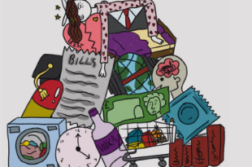The FA Cup was, for many years, the centrepiece of the season. Football fans of the ’70s and ’80s will remember incredible moments such as Arsenal’s late win against Manchester United in 1971, or the ‘Crazy Gang’ of Wimbledon beating the mighty Liverpool in 1988. In the last 20 years we have witnessed Ryan Giggs’s semi-final winner in 1999, taking Manchester United to a historic treble along with Wigan’s late victory against Manchester City in 2013.
Unfortunately these days it is clear that the FA Cup is not a competition that the so called ‘big teams’ take seriously anymore. What is certainly more worrying whatever, is the state of English football off the pitch: the biggest talking point of the FA Cup this year is likely to be an incident that occurred in a qualifying game between two non-league teams.
As previously reported in a Wessex Scene article, the BBC have found that racist incidents in British football have increased by 43% in the last year. This season it has been a recurring problem within the game; barely a week goes by without another shameful incident. Players such as Paul Pogba, Tammy Abraham and Hamza Choudhury have all faced horrific abuse on social media in relation to an on-field incident. Tottenham and Chelsea’s match in December was even halted when Antonio Rudiger complained of hearing monkey noises from spectators. The abuse is not about their ability – it surrounds the colour of their skin.
Abraham, who received such abuse off some of his own supporters after missing a penalty in the UEFA Super Cup final in August, made his response to any future action known after being called up to the England squad for their recent qualifiers against the Czech Republic, and a now infamous match against Bulgaria. He was firm in the belief that England’s only option – if they received any racist abuse from fans – was to walk off the pitch, which would hopefully force the hand of UEFA (European football’s governing body), to act decisively once and for all on an issue with which they have remained far too passive with for too long.
And so…what happened? England went to Bulgaria – a country already under scrutiny and playing with a limited capacity, due to prior incidents of racist abuse from their supporters. Raheem Sterling, Tyrone Mings (making his England debut, no less) and Marcus Rashford all received indistinguishable abuse from the home crowd. Mings at one point was heard turning to officials and asking ‘Did you hear that?’ after another wave of despicable monkey chants came his way. The game was stopped twice, with England threatening to leave the pitch. The offenders were removed from the stadium, some performing Nazi salutes on camera – a truly shocking image for anyone who loves the game to see it reduced to such shameful antics.
Shocking, I say? Of course it wasn’t. The England team stayed on the field (admirably, one might argue) and beat Bulgaria 6-0. But did those Bulgarian supporters care about the result? Was it worth staying on the pitch? Some would say no, and I would agree. It would make a stronger statement to leave the field of play, in defiance of the racists and those who protect them, in this instance.
The courage that many wished to see from England was unfortunately put into practice a week after the England v Bulgaria match. Haringey Borough took on Yeovil Town in an FA Cup qualifying match. The game itself was halted in the 64th minute, with Yeovil leading 1-0. Haringey goalkeeper Douglas Pajetat was allegedly spat on and had objects thrown at him by Yeovil fans. Another Haringey player was also reportedly the victim of racist abuse from the same set of supporters. Haringey manager Tom Loizou took it upon himself to make the bold decision to send his players off the pitch, resulting in the match being abandoned. Loizou remained adamant after the game that he had taken the right decision.
“There was no way I could let him (Haringey defender Coby Rowe) continue…If we get punished and thrown out, I don’t care“
Indeed, Loizou had made the right decision to take his players off. But unfortunately it is an act of courage and defiance that will undoubtedly do little to combat racism in British football. The match was a contest between two non-League teams in a competition that many football fans declare a second rate competition. The incident at Haringey was in the headlines for barely a week. The issue once again, has been swept under the rug by the FA, who for all their condemnation of the events both in Bulgaria and at Haringey, have ultimately failed to address the issue, just as their European counterparts have done. Those in the media offered their outrage; few offered solutions.
Outspoken on the issue of racism in the game, ex-professional Stan Collymore asked for and provided evidence to the fact that this is a problem that can be followed all the way through from the elite level of the sport, all the way down to grassroots football. Those involved in the game at grassroots level contacted Collymore with tales of racist abuse that went continually unpunished. The teams receiving the abuse were threatened with expulsion and the incidents descending into one of ‘he said, she said’. It continues to be properly unpunished. To get it out of the game, it must be the number one priority for the FA, UEFA and anyone else responsible for the governance of football.



